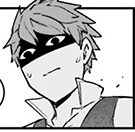What are your left wing manga/anime recommendations? I only got Ninpu Kamui Gaiden, because it is communist and ninjaic? You may shrug you shoulders, but a communist created all the ninja cliches, like a dude named Sasuke and the "Izuna Drop"! Unfortunately, the manga is from 1969, when the United States still had not erased all left-wing presence in Japan.


I like to describe I'm in Love With The Villainess as 'Lesbian isekai with Marxist-Leninist Characteristics', as it has a revolution lead by a vanguard party in the first two light novels (which the manga has yet to get past the first two LNs). 'Part 2' of the story does get away from the same precise political themes a bit but it's still entertaining (and it'll probably be nice if/when the manga gets there).
I also read Koroshiya Yametai! (or: I wanna be fired!) recently. It's kiinda mid but it's lesbian and there's an interesting polemic about refugees and their role as cheap labor in the global north.
I can also recommend the classic Akira, which while it isn't explicitly leftist it portrays the military-industrial complex in fairly left wing fashion and also talks about some of the struggles of poverty.
I'll definetly give the ones that you've posted a look :)
This is what I was hoping Magical Revolution of the Reincarnated Princess and the Genius Young Lady would be but it's a bourgeois revolution.
I havent finished that one yet, some of the polemics were interesting but the light novel was kinda meh and I havent watched the anime yet. Bummer that its bourgeois
It's still lesbian tho
That's always something
Just started the I'm In Love With the Villainess manga and holy shit is she down horrendous
Which one?
Main girl Rae of course.
The politics seem to start around chapter 16 and while I don't love the "rioting commoners were part of a shadowy plot" beat, the overall structure of how the magic system affects the material conditions is interesting.
Oh lol I see I had misunderstood what you had said. I think it felt more like the shadowy plot taking advantage of public anger to me which is why I felt like it works, since the agency is still with the populace at large. I'm glad you think it's interesting though!
Whatt
Okay so let me explain a BIT because some of it is a bit funky
spoilers, but not all of them!
The revolution is spearheaded by what reads explicitly to me as a vanguard party, led by a disgruntled former member of the aristocracy who asks for no compassion and wants to give no compassion. They exist only as a secret society at first, receiving foreign support from the Nur Empire which seeks to destabilize a geopolitical rival, the Bauer Kingdom. Reads a biiit like and
and  to me.
to me.
What puzzles me a bit ideologically speaking, and something that I still haven't really gone back to make heads or tails of, is that the revolution that happens ends up with basically the very chaotic series of events (that was about to end in the guillotining of the reactionary provisional government that had been formed)! instead ends with the monarchy being saved and a constitution being implemented to allow free elections. The constitutional monarchy still sees the royal family as being fairly influential, with all three of the prospective heirs retaining governmental posts both as figureheads and statesmen. Some of the nobles do still recover posts in the government as private citizens though, tapped for their experience in government and diplomacy. Still, their estates are dissolved. We still of course do NOT jump straight from feudalism to communism, this is clearly a feudalism to capitalism kind of situation.
The thing is though, the radicalization of the main love interest :claire-grin: is played incredibly straight, with her conversations with the high-ranking nun Lily regularly spreading clearly marxist polemics about the nature of feudal society. I fucking love how the author Inori was able to make marxist polemics interesting as a 'yuri scene,' in the same process with how Miyazawa talked about making science fiction palatable. Maybe I should make a blog post about that!
I haven't gotten to the politics yet beyond a couple of mentions of trade dependency, but it's pretty entertaining so far. Thanks for the recommendation.
Yeah it takes its sweet time to get into the juicy politics. I definetly think the light novel does it better, but it might just be the translator. It also has a lot to say about queer love as well, putting aside the class structure critiques :)